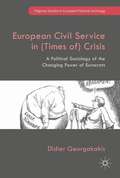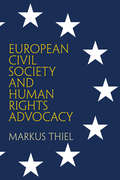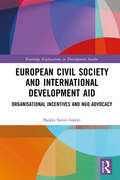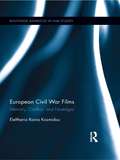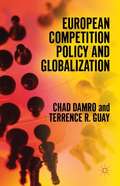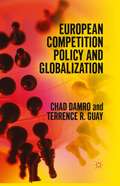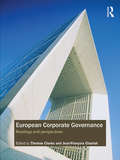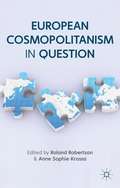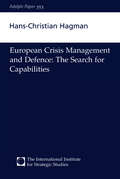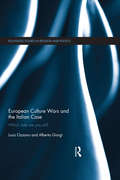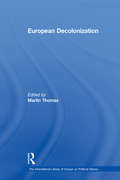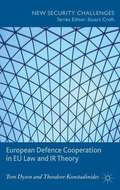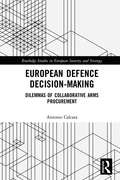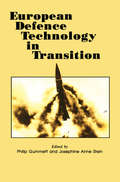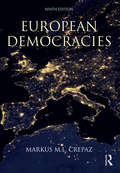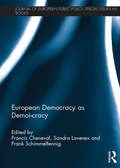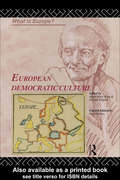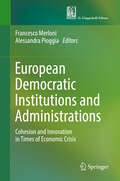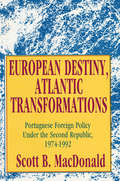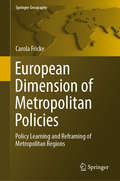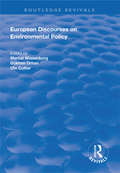- Table View
- List View
European Civil Service in (Times of) Crisis
by Didier GeorgakakisThis book, part of the new wave of political sociology in EU studies, examines the dialectics of construction/deconstruction of the European civil service through a succession of empirically grounded case studies. Breaking with the usual representations of 'Eurocrats', it sheds light on a hidden aspect of the current European crisis: a crisis of social reproduction which affects the European civil service in a heavy context of management reforms, enlargements, institutional changes and the euro crisis. This in turn has a number of consequences in terms of internal tensions, power, and more broadly, the capacity of EU institutions to create convergence between diverging national and economic interests, and to embody a European future. European Civil Service in (Times of) Crisis will be of interest to students and scholars across a wide range of disciplines, including politics, sociology and public administration, to practitioners working in and with the EU institutions, as well as those wishing to know more about the EU.
European Civil Society and Human Rights Advocacy (Pennsylvania Studies in Human Rights)
by Markus ThielAdherence to basic human rights norms has become an expected feature of states throughout the world. <P><P> In Europe, the promotion and protection of human rights through national governments has been enhanced by the diversity of intergovernmental organizations committed to this cause. The latest addition to the continent's rights organizations arrived ten years ago when, based on the EU's Lisbon Treaty, the Fundamental Rights Agency (FRA) was created as a functional institution to highlight and improve human rights within EU member states. In contrast to other regulatory agencies in the EU, the FRA provides a research-based advisory function for EU institutions and legislation and performs a public-diplomacy function in promoting fundamental rights across EU member states. <P><P>The linking of civil society with internal rights policies has yet produced very little scholarship. Markus Thiel's European Civil Society and Human Rights Advocacy not only fills this vacuum: it also offers a timely analysis in the context of Europe's proliferating human rights challenges, like the current refugee crises and the nationalist responses that geopolitical changes have provoked. <P><P>European Civil Society and Human Rights Advocacy examines the interaction between the FRA and hundreds of transnational civil society organizations working with and on behalf of vulnerable populations in EU member states and probes the high normative standards of human rights attainment and transnational participatory governance in the EU.Thiel surveys how networking among civil society organizations takes place, to what extent they are able to set the agenda or insert themselves into EU decision-making procedures, and how they are able to exploit the opportunity structure presented by the FRA's institutionalization of a voice for civil society. <P><P>Thiel draws conclusions for the larger issues of human rights promotion, transnational citizenship, and participatory governance in the region, reflecting broadly and critically on the legitimacy of EU human rights norms through a political sociology perspective.
European Civil Society and International Development Aid: Organisational Incentives and NGO Advocacy (Routledge Explorations in Development Studies)
by Balázs Szent-IványiThis book explains how and why European non-governmental development organisations (NGDOs) engage in advocacy towards the European Union (EU). It analyses the heterogenous structure of the sector, with examples ranging from large multinational networks to essentially single person NGDOs. The book provides a detailed map of the topics which have featured in NGDO advocacy since 2006, arguing that NGDOs have generally been reactive in their advocacy towards the EU. The author explains how they have contested a number of policy issues on the agendas of the EU institutions, especially around the diversion of aid to manage migration and leverage private sector investments. Furthermore, some NGDOs have used the COVID-19 pandemic as an opportunity to re-package their pre-existing policy demands. Based on an analytical framework focused around three variables, namely moral vision, funding concerns, and the need to build/maintain a ‘good’ reputation, the book explains these advocacy choices, and argues that much of NGDO advocacy seems to be consistent with funding motivations. The author highlights the importance of moral vision and reputational concerns in moderating how far NGDOs will go with funding-driven advocacy, arguing that motivations need to be looked at in their complexity, and within the specific policy context. Drawing on a range of quantitative and qualitative data sets to provide a rich and varied picture of the advocacy work of European development NGOs, European Civil Society and International Development Aid is a key reference for researchers and practitioners working in the field.
European Civil War Films: Memory, Conflict, and Nostalgia (Routledge Advances in Film Studies)
by Eleftheria Rania KosmidouThis book examines the ways in which late twentieth-century European cinema deals with the neglected subject of civil war. Exploring a range of films about the Spanish, Irish, former Yugoslavia, and Greek civil wars, this comparative and interdisciplinary study engages with contemporary debates in cultural memory and investigates the ways in which cinematic postmemory is problematic. Many of the films present an idealized past that glosses over the reality of these civil wars, at times producing a nostalgic discourse of loss and longing. Other films engage with the past in a melancholic fashion. These cinematic discourses articulate contemporary concerns, especially the loss of ideology and a utopian political horizon in the aftermath of the collapse of the Soviet bloc in 1989, a date that marks a significant break in European history and an accompanying paradigm shift in European cultural memory. Filmmakers examined include Trueba, Cuerda, Loach, Jordan, Kusturica, Dragojević, and Angelopoulos.
European Colonialism since 1700
by James R. LehningThis masterful synthesis provides a much-needed, complete survey of European colonialism from 1700 to decolonization in the twentieth century. Written by an award-winning author, this advanced undergraduate and graduate level textbook bridges, for the first time, the early modern Atlantic empires and the later Asian and African empires of 'high imperialism'. Viewing colonialism as a phenomenon of contact between Europe and the rest of the world, the author takes an 'entangled histories' approach, considering the surprising ways in which the imperial powers of Spain, Portugal, Great Britain, France and the Netherlands displayed their identities in colonial settings, as much as in their imperial capitals. The author illuminates for students the common themes of colonial government, economic development and cultural contact across empires, and reveals the ways in which these themes played out, through contrast of the differing development, structure and impact of each empire.
European Competition Policy and Globalization
by Terrence R. Guay Chad DamroThis book examines the domestic and international dimensions of European Union (EU) competition policy, particularly mergers, anti-competitive practices and state aids. The authors argue that important changes in EU competition policy are having profound effects on the global political economy, and these changes are best understood as European Commission responses to new domestic and international pressures. Using a two-level game analytical framework that is both intra-EU and global in scope, Damro and Guay investigate a wide variety of domestic and foreign public and private actors that interact in crucial ways to determine the development and implementation of EU competition policy. They address this broad question: In what ways do changing external and internal factors affect the evolution of the EU's competition policy and the role that the Commission plays in it? Among the conclusions is that the EU – and particularly the European Commission – has become a leading global regulator.
European Competition Policy and Globalization (Palgrave Studies In European Union Politics Ser.)
by Chad Damro Terrence GuayThis book examines the domestic and international dimensions of European Union (EU) competition policy, particularly mergers, anti-competitive practices and state aids. The authors argue that important changes in EU competition policy are having profound effects on the global political economy, and these changes are best understood as European Commission responses to new domestic and international pressures. Using a two-level game analytical framework that is both intra-EU and global in scope, Damro and Guay investigate a wide variety of domestic and foreign public and private actors that interact in crucial ways to determine the development and implementation of EU competition policy. They address this broad question: In what ways do changing external and internal factors affect the evolution of the EU's competition policy and the role that the Commission plays in it? Among the conclusions is that the EU – and particularly the European Commission – has become a leading global regulator.
European Consensus and the Legitimacy of the European Court of Human Rights
by Kanstantsin DzehtsiarouIn order to be effective, international tribunals should be perceived as legitimate adjudicators. European Consensus and the Legitimacy of the European Court of Human Rights provides in-depth analyses on whether European consensus is capable of enhancing the legitimacy of the European Court of Human Rights (ECtHR). Focusing on the method and value of European consensus, it examines the practicalities of consensus identification and application and discusses whether State-counting is appropriate in human rights adjudication. With over 30 interviews from judges of the ECtHR and qualitative analyses of the case law, this book gives readers access to firsthand and up-to-date information, and provides an understanding of how the European Court of Human Rights in Strasbourg interprets the European Convention on Human Rights.
European Constitutional Language
by András JakabIf the task of constitutional theory is to set out a language in which the discourse of constitutional law may be grounded, a question of the utmost importance is how this terminology is created, defined and interpreted. In this groundbreaking new work, András Jakab maps out and analyses the grammar and vocabulary on which the core European traditions of constitutional theory are based. He suggests understanding key constitutional concepts as responses to historical and present day challenges experienced by European societies. Drawing together a great and diverse range of literature, much of which has never before been touched upon by scholarship in the English language, Jakab reconceptualises and argues for a new understanding of European constitutional law discourse. In so doing he shines new light on what constitutes its distinctively European nature. This remarkable book is essential reading for all scholars and students of constitutional theory in Europe and beyond.
European Constitutional Law
by Robert SchützeWritten with exceptional clarity and fully updated from the first edition, the second edition of European Constitutional Law constitutes a classic textbook for students and practitioners of European law. Using a clear structural framework, the text guides readers through all of the core constitutional topics of EU law. Extracts from classic case law are complemented with extensive and critical discussion of the theoretical and practical aspects of the European Union and its law, leading students to a deep understanding of the subject. Chapters are enriched with more than fifty colour figures and tables, which clarify complex topics and illustrate relationships and processes. New suggestions for further reading direct students to significant pieces of academic literature for deeper self-study, and a companion website with full 'Lisbonised' versions of the cases cited in the text completes the learning package. Integrates numerous case extracts while maintaining a continuous, single-authored narrative, and combines straightforward explanations with scholarly analysis, highlighting theoretical approaches and key academic debates. A new two-colour design emphasises case extracts and enhances figures and tables, and two new appendices provide guidance on finding, reading and understanding EU law. A new companion website includes full 'Lisbonised' versions of the cases cited in the text, organised by chapter for quick and easy access.
European Corporate Governance: Readings and Perspectives
by Thomas Clarke Jean-François ChanlatFor decades, Europe has sought to become more financially integrated with the United States and thus European legal institutions, regulatory, governance and accounting practices have faced pressures to adapt to international competitive markets. Against this backdrop, European corporate governance systems have been criticized as being less efficient than the Anglo-American market based systems. This textbook examines the unique dimensions and qualities of European corporate governance. Reforms of key institutions, the doctrine of shareholder value and the seemingly irresistible growth of CEO power and reward are critically analyzed. The book brings out the richness of European corporate governance systems, as well as highlighting historical weaknesses that will require further work for a sustainable corporate governance environment in the future. In light of the most severe financial crisis since the 1930s, this intelligent look at European corporate governance is a vital textbook for courses on corporate governance and a great supplementary textbook on a host of business, management and accounting classes.
European Cosmopolitanism in Question
by Roland Robertson Anne Sophie KrossaIncluding a stellar line-up of international scholars, this book is an ambitious analysis of cosmopolitanism that will push the debate into new arenas, open up new lines of inquiry and have an impact on the study of globalization and global processes for years to come.
European Crisis Management and Defence: The Search for Capabilities (Adelphi series)
by Hans-Christian HagmanAssesses the EU and NATO's tools to prevent conflicts and manage international crises. It offers a unique insight into European security policy and questions the realism of the political goals. It argues for more coordination among European states, and an enhancement of the EU's strategic decision-making capabilities.
European Culture Wars and the Italian Case: Which side are you on? (Routledge Studies in Religion and Politics)
by Luca Ozzano Alberta GiorgiThis book aims to understand the European political debate about contentious issues, framed in terms of religious values by religious and/or secular actors in 21st century. It specifically focuses on the Italian case, which, due to its peculiar history and contemporary political landscape, is a paradigmatic case for the study of the relationships between religion and politics. In recent years, a number of controversies related to religious issues have characterised the European public debate at both the EU and the national level. The ‘affaire du foulard’ in France, the referendum on abortion in Portugal, the recognition of same-sex marriages in many Western European States, the debate over bioethics and the regulation of euthanasia are only a few examples of contentious issues involving religion. This book aims to shed light on the interrelation between these different debates, as well as their broader meaning, through the analysis of the paradigmatic case of Italy. Italy summarizes and sometimes exasperates wider European trends, both because of the peculiar role traditionally played by the Vatican in Italian politics and for the rise, since the 1990s, of new political entrepreneurs eager to exploit ethical and civilizational issues. This work will be of great interest to scholars and students of a number of fields within the disciplines of political science, sociology and law, and will be useful for courses on religion and politics, political parties, social movements and civil society.
European Decolonization (The International Library of Essays on Political History)
by Martin ThomasThis collection brings together twenty-one key articles that explore the nature and impact of colonial withdrawal. Ranging across all the European colonial powers, the articles discuss various aspects of decolonization, including the role of political violence, changing popular attitudes to empire and the inter-actions between colonial conflict and Cold War.
European Defence Cooperation in EU Law and IR Theory
by Tom Dyson Theodore KonstadinidesThis book offers a novel contribution to the study of post-Cold War European defence. Interdisciplinary in approach, it uses European law to assess the utility of existing theoretical accounts. By exploring the balance of threat theory, it provides new insights into the forces driving and hindering European defence cooperation.
European Defence Decision-Making: Dilemmas of Collaborative Arms Procurement (Routledge Studies in European Security and Strategy)
by Antonio CalcaraThis book comparatively examines the preferences of four key arms-producing states towards European joint armaments programmes. The European defence market is characterised by a mixture of inter-state competition and European cooperation, and this work assesses why countries sometimes decide to cooperate with their partners, while in other instances they refrain from doing so. In order to shed light on this empirical puzzle, the book focuses on state-defence industry relations in the four major European arms producers: France, Germany, Italy and the UK. The main argument is that the public or private governance of industrial suppliers and market size are the two decisive variables that explain the simultaneous presence of cooperation and competition in European defence procurement. Specifically, it argues that in public governance ecosystems, arms industries are able to "capture" the state's decision-making processes to their own advantage. In private governance ecosystems, the state is relatively autonomous from defence industry's influence and able to pursue larger macro-economic and military benefits. Moreover, the strategy pursued by governments and defence firms is decisively shaped by market size because of its importance in determining the relative costs and benefits of collaborative arrangements. This book will be of much interest to students of EU policy, defence studies, European politics and International Relations.
European Defence Technology in Transition
by Philip Gummett Josephine Anne SteinThis book draws on the ten nation CREDIT (Capacity for Research on European Defence and Industrial Technology) network which was set up to tackle issue concerning defence science, technology and industrial policy, including the implications of the Cold War and a growing pan-European emphasis.By providing a comparative study of policy and practice in the countries of western Europe, the book provides vital insights into how governments and firms can begin to search for European-wide solutions to the dilemmas that face them.
European Democracies
by Markus M.L. CrepazEuropean Democracies is an introduction to the politics and governments of Western, Central, and Eastern Europe. Organized thematically rather than country-by-country, this fully revised edition examines topics such as electoral systems, the European Union, refugees and the welfare state, and asks how to explain variations in policy outcomes, and how globalization is affecting European Democracies, among others. Throughout, the author treats Europe as a single but diverse entity and asks readers to compare what they learn about European politics with the politics of their own country. Key features in this new edition include: An updated thematic introduction to the politics and governments of Europe; Fully revised to include comprehensive coverage of recent electoral politics and political events in Europe, such as Brexit, the refugee crisis, and terrorist attacks; New chapters on immigration and the nature of European political culture and welfare state. New comparative sections covering topics such as political parties, and financial and political differences in governments between Europe and the USA. This key, in-depth text will be essential reading to anyone interested in European politics and comparative politics.
European Democracy as Demoi-cracy
by Francis Cheneval, Sandra Lavenex and Frank SchimmelfennigWhereas ‘democracy’ assumes a single demos or people, ‘demoi-cracy’ refers to democratic government and governance in a polity constituted by separate peoples. Since the European Union consists of many demoi with different collective identities, largely separate public spheres, and a predominantly national political infrastructure, demoi-cracy is an appropriate standard for the analysis and evaluation of democracy in the EU. In its vertical dimension, demoi-cracy is based on the equality and interaction of citizens’ and statespeoples’ representatives in the making of common policies. Horizontally, it seeks to balance equal transnational rights of citizens with national policy-making autonomy. This volume offers exemplary studies exploring the potential for and the workings of demoi-cracy in the EU across a broad range of institutions and issues in both its vertical and horizontal dimensions. In particular, the contributions address the following questions: Is demoi-cracy relevant to citizen attitudes and public discourse on the EU’s legitimacy? How do national and supranational democratic institutions interact? Do the EU’s modes of governance, such as regulation through agencies, mutual recognition, and the open method of coordination, meet demoi-cratic expectations? This book was originally published as a special issue of the Journal of European Public Policy.
European Democratic Culture (What is Europe? #Bk. 3)
by Alain-Marc Rieu Gérard DupratThese essays go beyond conventional studies of the institutions and parties of Europe to address Europe's democractic future more widely.While the book does offer an analysis of the democratic institutions of European countries, identifying common features and differences, as the editors put it, "institutions cannot function alone, like machines to produce concensus". So the book focuses on the fundamentals of European democratic culture. The authors argue that European social life and scientific learning have been indispensable components in the growth of the shared values that democracy pursues. They also analyse the dynamic tension brought to the life of democractic institutions by law, the desire for freedom, and critical public debate.With Europe engaged in perpetual self-examination, and rapid change, this book provides insights into its democractic past and prognosticates for its democratic future.
European Democratic Institutions and Administrations: Cohesion and Innovation in Times of Economic Crisis
by Francesco Merloni Alessandra PioggiaThis book presents the results of extensive international comparative research into the effects of the economic and financial crisis on democratic institutions and social cohesion policies. The collected studies describe and analyse the measures (often referred to as "reforms") adopted to counter the crisis and the effects of these measures.It investigates three areas: the impact on the functioning of institutions, with respect to the relationship between representative institutions and governments, and the organisational structure of administrations at national and local levels; the impact that the austerity policies on public spending have on social rights; and the impact on traditional instruments of public action (administrative simplification, public services delivering, the use of common assets).The general findings highlight the effect of reducing the administrative and government capacity of the democratic institutions: the public sector, rather than being innovative and made more effective, declines, offering increasingly poor public services and making bad decisions, fuelling substantive or formal privatisation solutions, which in turn cause further weakening.
European Destiny, Atlantic Transformations: Portuguese Foreign Policy Under the Second Republic, 1979-1992
by Scott B. MacDonaldWith the fall of its centuries-old empire in 1974-1975, Portugal embarked on a transitional period that reconciled a long tradition of acting out national interests overseas with the need to integrate itself into Western Europe. The result has been a deemphasis on various Atlantic and colonial linkages and the forging of a new and highly successful European identity within the framework of the European Community. In European Destiny, Atlantic Transformations Scott B. MacDonald offers a comprehensive analysis of Portugal's foreign policy and its highly successful venture in economic and political transformation. Although Portugal is firm in its commitment to a European destiny, it has not turned its back on relations with the United States and its former colonies hi Africa and Asia. MacDonald traces the evolution of U.S.-Portuguese cooperation along economic, cultural, and military lines and shows how NATO has played a pivotal role in the process. This was most recently underscored when the U.S. made extensive use of the Azores during the Gulf War against Iraq. Likewise, in its ties with the Lusophone countries formerly under its control - Cape Verde, Guinea-Bissau, S - o Tom" and Princip" - Portugal has sought to improve political relations and act as a peacemaker in regional conflicts such as those in East Timor, Angola, and Mozambique. The scope of MacDonald's work takes in issues posed to Portugal by new foreign policy concerns that range from the breakup of the Soviet Union to the rise of Islamic fundamentalism in North Africa and the Middle East. He points out that in a world of rapidly shifting political and economic alignments, Portugal provides a representative model of a relatively small nation that has undergone successful economic reform while deepening its commitment to its new democratic system. As such, the Portuguese model is instructive for newly emerging democracies of Eastern Europe and Latin America. European Destiny, Atlantic Transformations is an important addition to the literature on post-Cold War politics. It will be read by historians, economists, and foreign policy specialists.
European Dimension of Metropolitan Policies: Policy Learning and Reframing of Metropolitan Regions (Springer Geography)
by Carola FrickeThis book questions how policies for the metropolis become Europeanised. The book analyses how spatial concepts and political ideas permeate the European multi-level system. Through an interpretive comparison of five contexts, the book provides an overview of the European orientation tracing two interdependent developments. First, the book examines references to ‘Europe’ in national and subnational policies. In French and German policies, metropolitan regions are increasingly framed as being central not only for inter-municipal coordination, but also as nodes within the European space. Moreover, Europeanised metropolitan regions such as Lyon and Stuttgart develop European strategies. The second development shows how metropolitan regions appear as actors and issues in the European policy arena, contributing to a tentative and implicit metropolitan dimension. This multi-scalar analysis is of interest for scholars and practitioners specialised in metropolitan regions, European urban and regional policies, geography and related areas.
European Discourses on Environmental Policy (Routledge Revivals)
by Marcel Wissenburg Gökhan Orhan Ute CollierFirst published in 1999, this volume contributed to the debate on the European Union in furthering the study of environmental policy and, expressly, by introducing promising young scholars to the debate. The volume is based on a series of seminars for the Interdisciplinary Research Network on Environment and Safety (IRNES) with funding from the UK Economic and Social Research Council (ESRC). These new scholars explore areas including post-decisional politics, sustainability and agricultural biotechnology regulation.
